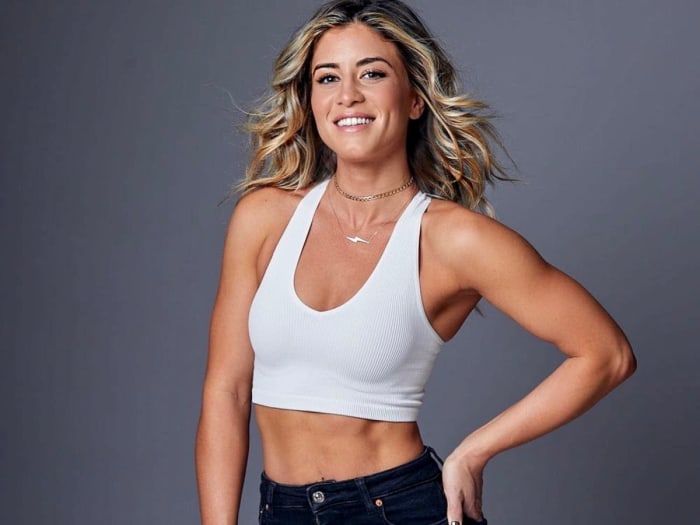Peloton Instructor Kendall Toole Reveals Working Out Helps Both Body and Mind

Photo courtesy of Kendall Toole
During the pandemic, the demand for Peloton equipment skyrocketed, which turned their instructors into household names. Kendall Toole is one of those definite breakout coaches who with her incredible playlists and feel-good energy has created a loyal following. She has connected with her clients on a deeper level despite never having ever met them in person. “If I have to think of my favorite part of my job – especially through such a challenging time – is that this community that was already in existence just grew and grew,” Toole says. “The beauty of being received by the community I get to help is that they also helped me. It was such a transformational experience.”
The 29-year-old former USC cheerleader clearly loves what she does and wants everyone to feel the impact of a workout. And by that, it’s not just about the external results of looking good, but also about what movement can do for a person’s mental health and overall well-being. Toole, who was diagnosed with anxiety and depression in college, relies on being physically active to ensure she continues to feel good. “You hear this from a lot of doctors and psychologists about stored trauma; how we hold things in our bodies and how it actually makes us sick and creates chronic inflammation and different things,” the NAMI ambassador shares. “That's why movement is so powerful.”
Keep reading for more about the benefits of a workout, what music will turn her frown upside down and why no one should ever feel alone in their struggles.
What was your fitness journey?
“It started with gymnastics when I was younger. I was a cheerleader at USC, and I loved that portion of my life. I just was always athletic, dancing and active. And then through the process of really doubling down into my mental health and part of that journey, especially my junior and senior years of college, I took up boxing. I was the only girl there most of the time and initially felt out of place, but I recognized how much power existed within me and how supportive and loving what one would think would be an aggressive environment really was. It was such a home base. It was so incredible for my mental health. That’s really what kicked it off, and I started training my friends for fun at school and getting really into fitness and learning to use that power and help instill it in other people.”
You battle with anxiety and depression. Do you find working out is a great way to deal with that?
“Completely. Having been diagnosed with anxiety and depression in college, I went through a very dark chapter my senior year of being suicidal. Movement has become one of the key things that I have in my toolbox and a way I take care of myself and honor my self-care and my mental health because of the immediate response. Both by how my body feels after but also moving through kind of the trauma, right?
Were there people who helped you in the beginning?
“It takes a village. I think that my biggest hurdle at my darkest moment was admitting that I needed help, that I couldn't do it on my own. When I had my darkest hour that senior year of college, I didn't understand that I was just functioning on a purpose level and just a shell of myself. I was numb. I didn't want to burden my family with my feelings. There was a lot of shame involved at that point that I just didn’t want to make the world feel as bad as I felt. And that it was a “me” problem. Really getting back to the simplicity of it was understanding I had a lot of people around me that I loved who knew I wasn’t okay. Always be a friend, always be the family member that holds space. I would say really understanding that asking for help isn’t a burden to somebody else. You’re giving that person the gift of helping you, of serving you through this period of your life.”
What do you say to someone who thinks someone they know is hurting but they don’t want to overstep?
“If you have enough emotional availability and enough emotional intelligence that somebody that you love and care about is not doing well, I believe that is your responsibility to follow through. We cannot do this alone. Not one of us can walk through this Earth without being supported and loved at some point in our lives. We are not meant to be isolated; we are not meant to be solo players in this game. It’s community. It is family. It is kinship. That’s what we need more than anything. Human beings are meant to be in groups; we’re not meant to be isolated. If you have the instinct, trust your gut. Your gut is never wrong.”
A lot of working out has to do with physical health, but the conversation has shifted that it is also so good for mental wellness. How do you get through those not-so-great days?
“Movement is key. The other thing, especially with an anxious mind or a depressed mind, is you get used to focusing or ruminating on one negative and everything piles on. We start to spiral. What’s important is when I’m having one of those days, it’s acknowledging it first. I’m a big proponent of therapy. I’ve been in therapy pretty much ever since I was diagnosed. I also love breath work, using somatic skills. Your breath is the quickest way to ground yourself back into your body, into space and focus on one holistic thing that then actually allows your blood pressure to come down and your heart rate to come down. Another somatic skill is called butterfly taps or butterfly breathing where you tap on your shoulders back and forth and focus on an even inhale and even exhale. And it’s something about getting the physical stimuli met with the breath that allows you to get out of your head for a second and get back centered in your body.”
I actually did my first breath work recently...
“The most beautiful thing is that it’s not an additional substance, it’s not a certain experience. It doesn’t cost thousands of dollars to go do it. It’s accessible to every single person because it’s just taking the tools that are in the body and acknowledging it.”
Your classes are as much about the music as they are the workout. Do you rely on music to get you through your feelings?
“What’s helped me a lot and is a by-product of fitness was music and creating playlists. I think that’s why I love having classes with different energies and different themes. Music was what could get the way that I was feeling. I would cry or I would be able to express my anger by feeling connected to that song. Allowing yourself to attack it head on and just live in it for a moment. I think that was the biggest thing that [after being in] such a dark place, the reframe of coming back into my own power was understanding that I was so close to not living my life that I want to live everything now. I just want to be as completely human as possible.”
What are some of your go-to songs?
“If I’m feeling blue and melancholy, it’s a perfect day to put on maybe The Beatles’ “Yesterday.” I have some epic rage playlists! I have a disco house playlist that if I am not put in a good mood by the third song, then I’m like, O.K., I got to try something else. We all have that emotional access within us and this tool of physical movement with it, there’s so much availability that we have inherently.”
And now you are able to teach your passion for boxing through it.
“We launched shadow boxing on the [Peleton] App. You don’t need any equipment. The other instructors and I teach you how to punch and teach you how to move. And especially for women, it’s been my honor to teach them how to fight. So often [women] are coming into this world and are always being told to be smaller, to have a quieter voice… minimize, minimize, minimize. What’s beautiful about boxing is that women can unlock that programming.”
With all of these tools and the work you put into yourself, do you feel you have a handle on your anxiety and depression?
“That’s going to be a weight that I carry for the rest of my time here. Knowing that and exploring how beautiful that is, and it’s not actually a burden, it’s something that has made me deeply empathetic. I think I’m more empathetic because of the depths I can feel and the struggles I have faced and will continue to face. It’s also a practice. It keeps me responsible; it keeps me aligned to myself because I have to make these practices a part of my day to day. What’s been so helpful since that really tough period and that diagnosis in particular is that I know every year I get a little bit more out of what I need, and the best part is I get more understanding of who I am. I’m grateful for my diagnosis; it’s what’s teaching me who I am. And I get to become myself more and more.”
